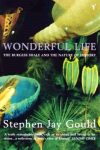 Do you question things enough? Sometime in March one of my regular newsletters mentioned this quote:
Do you question things enough? Sometime in March one of my regular newsletters mentioned this quote:
The most erroneous stories are those we think we know best – and therefore never scrutinize or question.
palaeontologist and biologist Stephen Jay Gould (1941-2002)
How true, I thought.
These range from stories we heard when we were young, to stories spread that are deliberately misleading, but plausible enough to pass. When young, we either took them to heart without question, or slightly changed them, as people do, to lose the meaning.
Sometimes when I’m writing, especially in science fiction, I think about misleading my characters by design. It’s the placing of threads to lead them into danger, or just to catch them unawares. Maybe I should let them fall into traps by themselves more often, simply by not questioning what they ‘know’.
Factoids are things we should question
Are we becoming far more aware of this as a technique used to manipulate us? Or is social media so busy we don’t know how to find the truth any more? After ‘fake news’ first appeared, I was surprised to find that the definition of ‘factoid’ was not, as I assumed, a snippet of information, a useful fact, but a fact thought to be true by custom and practice that is actually false. I had never questioned the use of the word. I should probably check the definitions of ‘meme’ and ‘trope’ as well, as I think I use them incorrectly!
There might be a more concrete example I can use, and I know I’ve had one recently, but I’ve pushed it to the back of my mind again.
 I wonder why Stephen Jay Gould said this. I have some of his excellent books on my non-fiction reading challenge list. Was he guarding against accepting the prevailing scientific theories? Maybe I should read his books to answer that question!
I wonder why Stephen Jay Gould said this. I have some of his excellent books on my non-fiction reading challenge list. Was he guarding against accepting the prevailing scientific theories? Maybe I should read his books to answer that question!
Have you any stories you think you should question?


Hi Jemima – if I’m not sure – I will check .. especially when I write it on the blog – but I’m sure unintentional things slip through. I certainly didn’t know a factoid meant a falsehood nurtured over time … interesting to say the least – and this morning I’ve looked up a couple of words I’d have used incorrectly … but I’m so grateful I can sit here and do just that!
The challenge is getting others to not believe the headlines they see and thus believe. Cheers Hilary
http://positiveletters.blogspot.co.uk/2017/04/q-is-for-quirky-quizzy-facts-and-quaggas.html
Yes, I didn’t want to be too heavy when I wrote this. We’ll have to gear up for questioning the headlines over the next few weeks in the UK. Sigh.
I’ll be over soon 😉 Just writing tomorrow’s post lol
Oh, the arguments I’ve gotten into when I ask folks questions about ‘facts’ in the Bible. I just ask them to state another source that verifies it. Having been in politics for many years, I know that facts are not reported correctly. It becomes the ‘fact’ that will sell the newspaper.
@msdeniseh553
Denise at My Life in Retirement Old Quarter and Fortifications, Luxembourg
Whenever anyone quotes something from the Bible that is cruel or nasty I ask if it is in Leviticus. I know some cruel and nasty things that are in Leviticus, but nobody I’ve challenged has ever come up with a decent reference (even where in the Bible), so I tend to stop the discussion, at any rate. 🙂
Hi Jemima. Like Hilary I didn’t know what a ‘factoid’ was. It sounds like something from outer space. It’s great to learn new terms and real facts every day though. Very informative and original post.
One of those posts where I read something on someone else’s blog and it sets me off! I do quite a lot of those 🙂
Got me on the definition of “factoid” too. So I hauled out my OED (ca. 1980) and Webster’s (ditto) to check, and learned something else: the word isn’t in those dictionaries, so it must be more recent. Webster’s on-line confirms that we are not wholly wrong: they define it as a) an invented fact etc. as you note, and b) a briefly stated and usually trivial fact. So it can mean both an actual (but unimportant) fact, and a lie.
The Ninja Librarian’s Favorite Characters
For once I checked the dictionary for the definition I gave above. Concise Oxford Dictionary “New Edition for the 90s” (1991) 🙂 The ‘unimportant fact’ looks to have been superseded. That was my original understanding, so maybe it’s language in change…
I thought a factoid was an unimportant little fact. So many times when I know the truth about something, for instance I was there, I know that the news is off, but there are many more things where I wasn’t there so just doubt most of it.
Finding Eliza
Yes, it looks like things have changed… and doubting most of it seems the best policy these days 🙂
I think lately, people are questioning things less and less. It’s like they just want to confirm their bias.
~Patricia Lynne aka Patricia Josephine~
Story Dam
Patricia Lynne, Indie Author
Yes, come to think of it, I may be guilty of that.